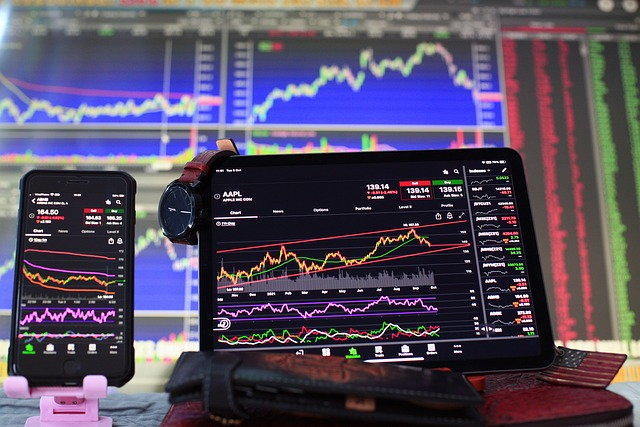
The Ultimate Guide to Understanding Forex Trading: A Beginner's Perspective
The Ultimate Guide to Understanding Forex Trading: A Beginner's Perspective
Forex trading, also known as foreign exchange trading, is the buying and selling of currencies on the foreign exchange market.
It is the largest and most liquid financial market in the world, with an average daily trading volume of over $5 trillion.
Forex trading can be a lucrative venture for beginners, but it is important to have a solid understanding of how it works and the risks involved.
What is Forex Trading and How Does it Work?
Forex trading involves the simultaneous buying of one currency and selling of another.
Currencies are traded in pairs, such as EUR/USD or GBP/JPY.
The first currency in the pair is called the base currency, while the second currency is called the quote currency.
The exchange rate between the two currencies determines how much of the quote currency is needed to buy one unit of the base currency.
Forex trading takes place in the decentralized over-the-counter (OTC) market, where participants trade directly with each other without the need for a central exchange.
The market is open 24 hours a day, five days a week, allowing traders to take advantage of opportunities around the clock.
Transactions are conducted electronically through computer networks, with major financial centers such as London, New York, Tokyo, and Sydney serving as hubs for forex trading.
Understanding the Forex Market: Key Players and Factors
The forex market is influenced by a variety of factors, including economic indicators, political events, and market sentiment.
Key players in the market include central banks, commercial banks, hedge funds, and retail traders.
Central banks play a crucial role in the forex market by setting interest rates and implementing monetary policy to stabilize their respective economies.
Economic indicators, such as GDP growth, inflation rates, and employment data, can have a significant impact on currency prices.
Political events, such as elections or geopolitical tensions, can also cause volatility in the forex market.
Market sentiment, or the overall attitude of traders towards a particular currency, can be influenced by factors such as news headlines, investor sentiment, and technical analysis.
The Benefits and Risks of Forex Trading for Beginners
Forex trading offers several advantages for beginners.
One of the main benefits is liquidity, as the forex market is the most liquid market in the world.
This means that traders can enter and exit positions quickly and at a fair price.
The forex market is also highly accessible, with low barriers to entry. Retail traders can open trading accounts with as little as a few hundred dollars and trade with leverage, which allows them to control larger positions with a smaller amount of capital.
However, forex trading also carries risks that beginners should be aware of.
One of the main risks is volatility, as currency prices can fluctuate rapidly and unpredictably.
This can lead to significant gains or losses in a short period of time. Another risk is leverage, which amplifies both profits and losses.
While leverage can increase potential profits, it can also lead to large losses if not used properly.
Finally, there are also scams and fraudulent brokers in the forex market, so beginners should be cautious and do thorough research before choosing a broker.
Choosing a Forex Broker: Tips and Considerations

Choosing a reputable forex broker is crucial for beginners.
There are several factors to consider when selecting a broker, including regulation, fees, customer support, and trading platforms.
Regulation ensures that the broker operates in accordance with strict financial rules and provides a level of protection for traders.
It is important to choose a broker that is regulated by a reputable authority, such as the Financial Conduct Authority (FCA) in the UK or the National Futures Association (NFA) in the US.
Fees are another important consideration when choosing a forex broker.
These can include spreads, commissions, and overnight financing charges.
It is important to compare fees across different brokers to ensure that you are getting the best deal.
Customer support is also important, as you may need assistance with technical issues or have questions about trading. Look for a broker that offers responsive and helpful customer support.
Basic Forex Trading Strategies for Beginners
There are several different trading strategies that beginners can use in forex trading.
One popular strategy is scalping, which involves making small profits on small price movements.
Scalpers typically hold positions for a few seconds to a few minutes.
Another strategy is swing trading, which involves holding positions for a few days to a few weeks to take advantage of larger price movements.
Position trading is a longer-term strategy that involves holding positions for weeks to months.
Technical analysis and fundamental analysis are two approaches to analyzing the forex market.
Technical analysis involves studying historical price data and using indicators and chart patterns to predict future price movements.
Fundamental analysis, on the other hand, involves analyzing economic and political factors that can influence currency prices.
Both approaches have their pros and cons, and many traders use a combination of both.

Technical Analysis vs. Fundamental Analysis: Which is Better?
https://www.mql5.com/en/market/product/47776
Multi Time Frame Multi Currency Signals Dashboard
https://www.mql5.com/en/market/product/47755
https://www.mql5.com/en/market/product/47989
https://www.mql5.com/en/market/product/50592
There is an ongoing debate among traders about whether technical analysis or fundamental analysis is better for predicting currency prices.
Technical analysis is popular among short-term traders who rely on charts and indicators to make trading decisions.
It is based on the belief that historical price data can provide insights into future price movements.
Technical analysis can be useful for identifying trends, support and resistance levels, and entry and exit points.
Fundamental analysis, on the other hand, focuses on economic and political factors that can influence currency prices.
It involves analyzing economic indicators, such as GDP growth, inflation rates, and interest rates, as well as political events and market sentiment.
Fundamental analysis can be useful for long-term traders who are interested in the underlying value of a currency.
Common Forex Trading Mistakes to Avoid
There are several common mistakes that beginner traders should avoid.
One of the most common mistakes is overtrading, or trading too frequently and taking on too many positions.
This can lead to increased transaction costs and emotional stress.
Another mistake is not using stop-loss orders, which are orders that automatically close a position at a predetermined price to limit losses.
Stop-loss orders are important for managing risk and protecting capital.
Other common mistakes include not having a trading plan, chasing losses, and not managing risk properly.
It is important to have a trading plan that outlines your goals, trading strategy, and risk management rules.
Chasing losses, or trying to recover losses by taking on more risk, can lead to even bigger losses. Proper risk management involves setting stop-loss orders, using appropriate position sizing, and diversifying your portfolio.
Developing a Forex Trading Plan: Setting Goals and Managing Risk
Having a trading plan is essential for success in forex trading.
A trading plan is a written document that outlines your goals, trading strategy, and risk management rules.
It helps you stay focused and disciplined, and provides a framework for making trading decisions.
When developing a trading plan, it is important to set realistic goals and define your risk tolerance.
Setting goals involves determining how much money you want to make and how much time you are willing to spend on trading.
It is important to set both short-term and long-term goals, and to regularly review and update your goals as your trading skills improve.
Managing risk involves setting stop-loss orders, using appropriate position sizing, and diversifying your portfolio.
It is important to only risk a small percentage of your capital on each trade to protect against large losses.
Trading Psychology: How to Stay Focused and Disciplined
Trading psychology plays a crucial role in forex trading.
It is important to stay focused and disciplined, and to control your emotions when making trading decisions.
Fear and greed are two common emotions that can cloud judgment and lead to poor trading decisions.
Fear can cause traders to hesitate or exit positions too early, while greed can cause traders to take on excessive risk or hold onto losing positions.
To stay focused and disciplined, it is important to have a routine and stick to it.
This includes setting aside dedicated time for trading, following your trading plan, and avoiding distractions.
It is also important to manage your emotions by practicing mindfulness and self-awareness.
This involves recognizing when you are feeling fearful or greedy and taking steps to calm yourself down, such as taking a break or practicing deep breathing exercises.
Resources for Learning and Improving Your Forex Trading Skills
There are several resources available for learning about forex trading and improving your skills.
Books are a great starting point, as they provide in-depth knowledge and insights from experienced traders.
Some popular books on forex trading include "Trading in the Zone" by Mark Douglas, "Japanese Candlestick Charting Techniques" by Steve Nison, and "Technical Analysis of the Financial Markets" by John J. Murphy.
In addition to books, there are also online courses, webinars, and forums where you can learn from experienced traders.
Many brokers offer educational resources and demo accounts where you can practice trading without risking real money.
It is also important to stay up-to-date with market trends by following financial news websites, reading market analysis reports, and participating in online trading communities.
Forex trading can be a rewarding venture for beginners, but it is important to have a solid understanding of how it works and the risks involved.
By understanding the basics of forex trading, choosing a reputable broker, developing a trading plan, and managing your emotions, you can increase your chances of success in the forex market.
Remember to continue learning and practicing your skills, as forex trading is a lifelong journey of growth and improvement.



